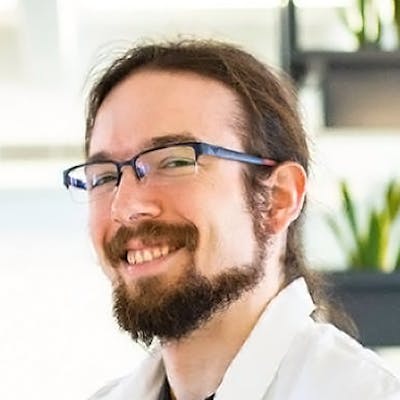The company I work for tries to mitigate the social impact of the COVID-19 pandemic. Once in a while, we have on-line coffees and lunches. During one of them, we were exchanging stories about how we started to code. When I finished telling mine, I saw my colleagues surprised by the absurdity of the turn of events. It was the time when I realized how peculiar my story is, so I decided to write it down.
The beginnings
For the majority of my school years, I had no idea what should my career path become. So many things interest me that focusing on one is nearly impossible. I always liked looking for parallels in unrelated subjects. I loved looking at diagrams comparing bones in batwing with bones in the human arm. I loved learning languages and finding common patterns between them. I loved realizing how micro- and macrocosm are similar and ruled by universal laws.
Generally, I wanted to preserve my childish curiosity at all costs.
One thing that grasped my particular attention was computers. They were present in my life from the earliest years. When I was 4, my uncle bought me a Commodore 64, and I loved to experiment with it. When I was 7, my family bought the first PC. The internet had been uncommon, so I was learning how to handle computers from paper magazines. Later on, I became a technical expert in the family. I used to be always fixing stuff and figuring out what went wrong with family laptops or tablets. I had never been programming, though.
The school
I liked learning languages and reading books, so, by the advice from my parents, I decided to pursue humanities in school. It was all great to discover, but as I grew older, I realized that my career choices might become limited. If I were to find a job, it was likely to be outside of my specialty, or I would have to compete with plenty of similarly educated people.
In high school, I realized that pursuing a career in law was reasonable. I wanted to become either a notary or a solicitor. I imagined myself helping people to get through the nuances of the law and make their lives better. I knew it might be hard to land a job there, but it seemed like something worth trying.
Oh, I would regret that so much.
Later on, I realized that I would be stuck in a never-ending loop of interpretation of law paragraphs while trying to catch up on all changes issued by the government. Not that the law is so complicated that it can leave everyone confused. That would ultimately lead to my burnout, so I would be unable to help people as I wished to.
The strange coincidence
When I was reaching the end of my high school, something odd happened. One day, my history teacher told me that Jagiellonian University holds a competition where you could win admission to a major of your choice. The only thing I had to do was to read 23 volumes about the history of the university.
It was a daunting task, but I managed to read them all and get through the elimination round. It blew me away that I did.
The second round consisted of 83 participants, who were to fight for one of 76 degrees. The winner could pick from a full roster, the runner-up from 75 of them, and so on.
I knew it would be hard to win a law degree, so I already had several backup options in my head.
I finished the competition in 58th place. When it was my turn to pick, the interesting applications were already gone. I went to the table without high hopes for an appropriate fallback degree. Then, as I was skimming through the list, I stumbled upon computer science. In this particular moment, I recalled my fascination with computers and thought that it’s a great degree to choose, so I did.
The sweetest loss
I always had good grades at school, so my finals were a shock for me. They went so badly that I could not compete with other law applicants. I still gave it a shot, but in the end, I was somewhere near the bottom of the list of future law students. It seemed like it was about time to kick-off plan B.
I applied to CS when all languages I knew were Polish, English, and a bit of German.
My freshman year was tough — I had to catch up on mathematics knowledge that I missed during my past education, but it was worth it. I spent a lot of time on that, but I was still having fun exploring new concepts and learning how to create things through code.
During my 3rd year, my friend from the university approached me and told me that he had started a job at a company that still looks for young and bright programmers and that I seem like a good fit. I agreed, even though I had to learn Ruby from scratch.
The job helped me ground my theoretical knowledge. I found work and studying to be complementary, strengthening each other. I ended my degree with almost four years of commercial experience.
What lies ahead
Now here I am, with several professional projects under my sleeve and constantly gaining experience as a back-end web developer.
I got hired by a company that I heard of when I was starting my degree. My friends told me how difficult it was to get there, but the work pays off thanks to exciting projects and wise people to learn from.
I have spoken at several meetups and organized several workshops for students.
Even though I know something about programming, the vastness of knowledge still makes me feel as curious as I was in my childhood.
I think I manage to carry on my mission of helping people. The projects that make me the proudest operate in areas of education and healthcare. I consciously pick the ones that have an impact on the everyday life of ordinary people.
Conclusion
Looking at where I come from and where I am now, I am happy with how it all turned out. What next? It’s hard to tell, but I see plenty of opportunities ahead. Maybe in the next couple of years, I will write a follow-up to this post and ponder on what happened along the way.
In the meantime, I hope that if you consider starting a career in IT, you will find the courage to take the first step. Who knows, maybe we will meet one day and have a good story to share?

